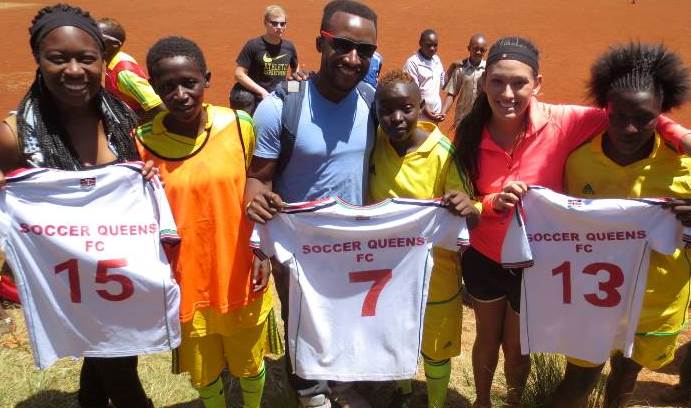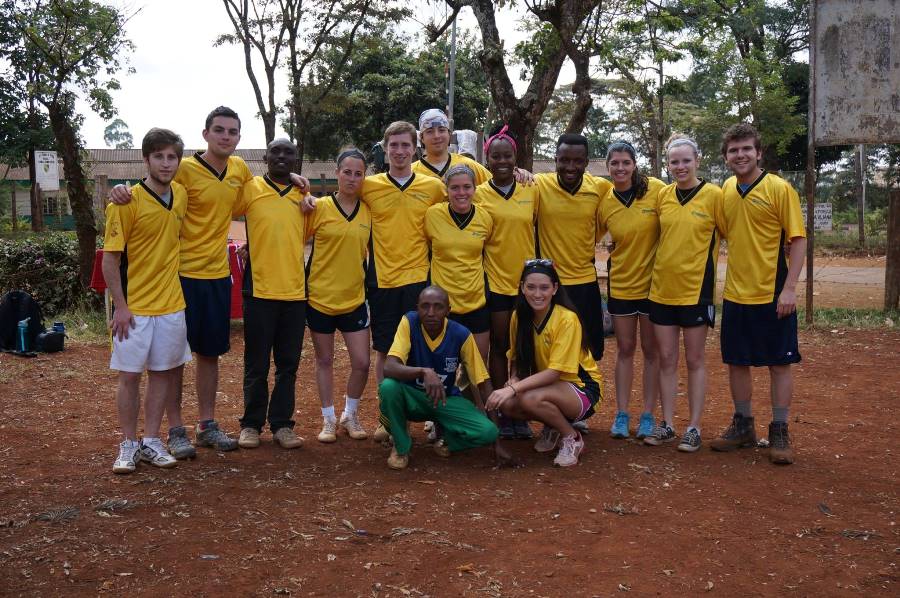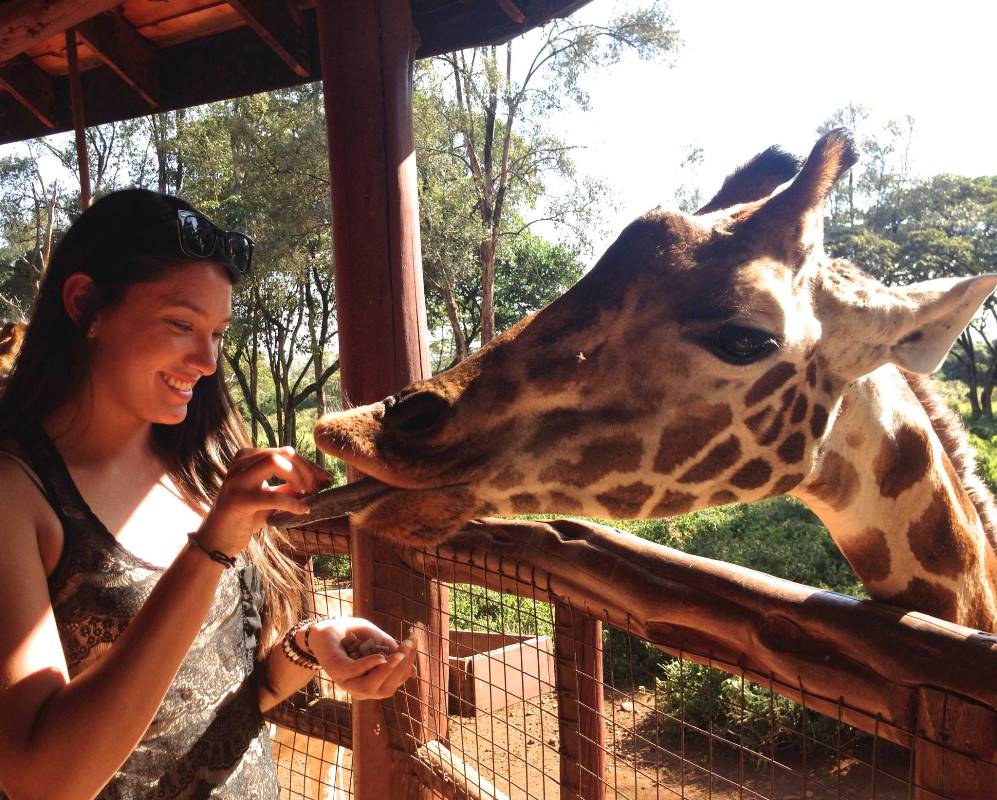Soccer and entrepreneurship in Kenya

Raven Gaddy ’15, Ralph Jean-Noel ’15 and Katie Kiewel ’15 (l-r) meet with members of the Soccer Queens (in yellow uniforms).
Visitors to Kenya, says Mark Orrs, are often shocked to see bands of homeless boys and young men roaming city streets. These “street boys” engage in sporadic day labor, collecting scrap metal, hauling vegetables or washing cars. Many of them sniff glue from bottles clipped to the insides of their shirts, which offers temporary relief from hunger pangs but can cause neurological damage over time.
Estimates of the numbers of Kenya’s street boys range to the tens or hundreds of thousands, says Orrs. Poverty and abusive or alcoholic parents drive most of them from their homes. Few leave the streets to lead more constructive lives.
Orrs has introduced two groups of Lehigh students to one former street boy, Amos Ndungu Kimani, who did manage to escape. The students traveled to Kenya over spring break in 2013 and 2014 to help the Soccer Queens, a team Amos founded several years ago for young women and teenage girls.
Orrs, who directs Lehigh’s sustainable development program, has visited Kenya a dozen times in the past decade. He is co-founder of The Dagoretti Fund, a nonprofit that provides education and housing to former street children like Amos. The organization also supports the Soccer Queens.
“I am very humbled and privileged to work with Mark and his students,” said Ndungu. “Their skills and social and financial support will allow the Soccer Queens organization to gain stability.”
“A force to be reckoned with”
Since founding the Soccer Queens, says Orrs, Amos has attended several workshops for coaches. The team has grown to 44 players, four of whom have gone on to play for Kenya’s national soccer team. One scored a goal in a match with Rwanda.
The Lehigh students who visited Kenya in 2013 helped the Soccer Queens raise seed money using social media and crowdfunding sites. They also helped the team qualify for the Kenyan Premier League, the top-tier women’s soccer league in the Kenyan football league system.
“These girls are a force to be reckoned with,” said Raven Gaddy ’15, a global studies major who went on both excursions to Kenya. “The amount of skill they possess in the game of soccer is insane. And they have a passion for the game and for each other like I have never seen before.
“Beating almost any team I’ve seen them play, even boys, they’ve made it to the Premier League. This is the most prestigious league in Kenya, yet they are not receiving the benefits and honor they deserve.
“The Soccer Queens are a family that lives, plays, laughs and struggles together. I was very impressed this trip by their forward thinking and willingness to start businesses to support themselves.”
One goal of the Lehigh students who went to Kenya this past spring is to help the Queens start small businesses that generate revenue for rent and travel.
“The Soccer Queens have become extraordinarily successful,” said Orrs, “but they face financial challenges. Our students are trying to help them become self-sustaining.”
“Entrepreneurship is a very new concept for me,” said Gaddy. “That being said, I feel that the Kenyan entrepreneurs we met were resilient, proactive and had a great sense of needs in the community.
“Some of these individuals needed some basic assistance with record-keeping, diversification or business canvas exposure, they were quite intelligent. They were great assets to us learning exactly how our business ventures may fit into their communities.”
Gaddy and Ralph Jean-Noel ’15, another global studies major who went on the 2014 Kenya excursion, are teaming with Katie Kiewel, a finance and marketing double major who made the 2014 trip, to help the Soccer Queens explore possible entrepreneurial projects.
“You can’t understand what’s feasible and what’s not without first going there,” said Kiewel. “We would like to see the Soccer Queens become self-sustaining. We’re helping the girls come up with business ideas to support themselves.”
Rising to steep challenges
Twelve students from a variety of majors went to Kenya for eight days this spring. Because of heightened security concerns owing to recent terrorist attacks, the group did not go into the capital city of Nairobi but spent their time instead in smaller towns and rural areas. Amos accompanied the students and took them one day to a feast at his family’s house. A safari and a stop at a giraffe sanctuary were also included in the itinerary.
“Before the trip, we contacted everyone we were going to meet in Kenya,” says Kiewel. “Each day we met with community members, politicians or entrepreneurs.”
One of those entrepreneurs is marketing a device that uses solar energy to power lights and to charge the cell phones that are ubiquitous in Kenya. The students also met Michael German, a Lehigh graduate student who is working with Arup SenGupta, professor of civil and environmental engineering, on a project to decrease fluoride content in Kenya’s well water.
The Kenyan people face challenges that are not common in the United States, the students said.
“From Sunday to Thursday,” said Kiewel, “they don’t have running water in some areas. Also, many children take care of themselves at a very young age. It’s normal there, in rural areas, for children who are just 6 or 7 years old to herd cattle and sheep.”
At a Masai village, the students saw houses made of mud, cow dung and sticks. Elsewhere, the dwellings they saw ranged from shanties with tin roofs to buildings made of concrete and equipped with electricity and running water.
Despite, or perhaps because of, poverty and hardship, the Kenyan people seem to be possessed of a uniquely resilient spirit, the students said.
“Kenyans are probably the most hospitable, friendly and welcoming people I have ever met,” said Gaddy. “I have formed life-long friendships, and have become a part of the community on my repeat trips. As well, I can proudly say that I have a Kenyan family in Kinangop and a ‘niece’ in Kikuyu. There is nothing like the feeling of happiness that Kenyans make you feel.”
The Kenya trip was part of Entrepreneurship 307: International Social Entrepreneurship, a course that is cross-listed with the international relations department and the sustainable development program. The course, co-taught by Orrs and Todd Watkins, the Arthur F. Searing Professor of Economics, was developed by Watkins and Bruce Moon, professor emeritus of international relations.
Students in previous Entrepreneurship 307 classes have traveled to Zambia, Ghana and Cambodia.
The Baker Institute for Creativity, Innovation and Entrepreneurship provided subsidies for the students who went to Kenya. Funds were also made available by the Africana studies and sustainable development programs.
Estimates of the numbers of Kenya’s street boys range to the tens or hundreds of thousands, says Orrs. Poverty and abusive or alcoholic parents drive most of them from their homes. Few leave the streets to lead more constructive lives.
Orrs has introduced two groups of Lehigh students to one former street boy, Amos Ndungu Kimani, who did manage to escape. The students traveled to Kenya over spring break in 2013 and 2014 to help the Soccer Queens, a team Amos founded several years ago for young women and teenage girls.
Orrs, who directs Lehigh’s sustainable development program, has visited Kenya a dozen times in the past decade. He is co-founder of The Dagoretti Fund, a nonprofit that provides education and housing to former street children like Amos. The organization also supports the Soccer Queens.
“I am very humbled and privileged to work with Mark and his students,” said Ndungu. “Their skills and social and financial support will allow the Soccer Queens organization to gain stability.”
“A force to be reckoned with”
Since founding the Soccer Queens, says Orrs, Amos has attended several workshops for coaches. The team has grown to 44 players, four of whom have gone on to play for Kenya’s national soccer team. One scored a goal in a match with Rwanda.
The Lehigh students who visited Kenya in 2013 helped the Soccer Queens raise seed money using social media and crowdfunding sites. They also helped the team qualify for the Kenyan Premier League, the top-tier women’s soccer league in the Kenyan football league system.
“These girls are a force to be reckoned with,” said Raven Gaddy ’15, a global studies major who went on both excursions to Kenya. “The amount of skill they possess in the game of soccer is insane. And they have a passion for the game and for each other like I have never seen before.
“Beating almost any team I’ve seen them play, even boys, they’ve made it to the Premier League. This is the most prestigious league in Kenya, yet they are not receiving the benefits and honor they deserve.
“The Soccer Queens are a family that lives, plays, laughs and struggles together. I was very impressed this trip by their forward thinking and willingness to start businesses to support themselves.”
One goal of the Lehigh students who went to Kenya this past spring is to help the Queens start small businesses that generate revenue for rent and travel.
“The Soccer Queens have become extraordinarily successful,” said Orrs, “but they face financial challenges. Our students are trying to help them become self-sustaining.”
“Entrepreneurship is a very new concept for me,” said Gaddy. “That being said, I feel that the Kenyan entrepreneurs we met were resilient, proactive and had a great sense of needs in the community.
“Some of these individuals needed some basic assistance with record-keeping, diversification or business canvas exposure, they were quite intelligent. They were great assets to us learning exactly how our business ventures may fit into their communities.”
Gaddy and Ralph Jean-Noel ’15, another global studies major who went on the 2014 Kenya excursion, are teaming with Katie Kiewel, a finance and marketing double major who made the 2014 trip, to help the Soccer Queens explore possible entrepreneurial projects.
“You can’t understand what’s feasible and what’s not without first going there,” said Kiewel. “We would like to see the Soccer Queens become self-sustaining. We’re helping the girls come up with business ideas to support themselves.”
Rising to steep challenges
Twelve students from a variety of majors went to Kenya for eight days this spring. Because of heightened security concerns owing to recent terrorist attacks, the group did not go into the capital city of Nairobi but spent their time instead in smaller towns and rural areas. Amos accompanied the students and took them one day to a feast at his family’s house. A safari and a stop at a giraffe sanctuary were also included in the itinerary.
“Before the trip, we contacted everyone we were going to meet in Kenya,” says Kiewel. “Each day we met with community members, politicians or entrepreneurs.”
One of those entrepreneurs is marketing a device that uses solar energy to power lights and to charge the cell phones that are ubiquitous in Kenya. The students also met Michael German, a Lehigh graduate student who is working with Arup SenGupta, professor of civil and environmental engineering, on a project to decrease fluoride content in Kenya’s well water.
The Kenyan people face challenges that are not common in the United States, the students said.
“From Sunday to Thursday,” said Kiewel, “they don’t have running water in some areas. Also, many children take care of themselves at a very young age. It’s normal there, in rural areas, for children who are just 6 or 7 years old to herd cattle and sheep.”
At a Masai village, the students saw houses made of mud, cow dung and sticks. Elsewhere, the dwellings they saw ranged from shanties with tin roofs to buildings made of concrete and equipped with electricity and running water.
Despite, or perhaps because of, poverty and hardship, the Kenyan people seem to be possessed of a uniquely resilient spirit, the students said.
“Kenyans are probably the most hospitable, friendly and welcoming people I have ever met,” said Gaddy. “I have formed life-long friendships, and have become a part of the community on my repeat trips. As well, I can proudly say that I have a Kenyan family in Kinangop and a ‘niece’ in Kikuyu. There is nothing like the feeling of happiness that Kenyans make you feel.”
The Kenya trip was part of Entrepreneurship 307: International Social Entrepreneurship, a course that is cross-listed with the international relations department and the sustainable development program. The course, co-taught by Orrs and Todd Watkins, the Arthur F. Searing Professor of Economics, was developed by Watkins and Bruce Moon, professor emeritus of international relations.
Students in previous Entrepreneurship 307 classes have traveled to Zambia, Ghana and Cambodia.
The Baker Institute for Creativity, Innovation and Entrepreneurship provided subsidies for the students who went to Kenya. Funds were also made available by the Africana studies and sustainable development programs.
Posted on:
Friday, June 13, 2014



